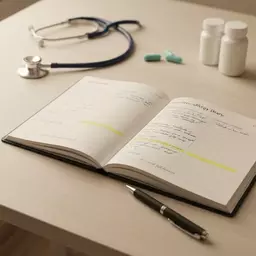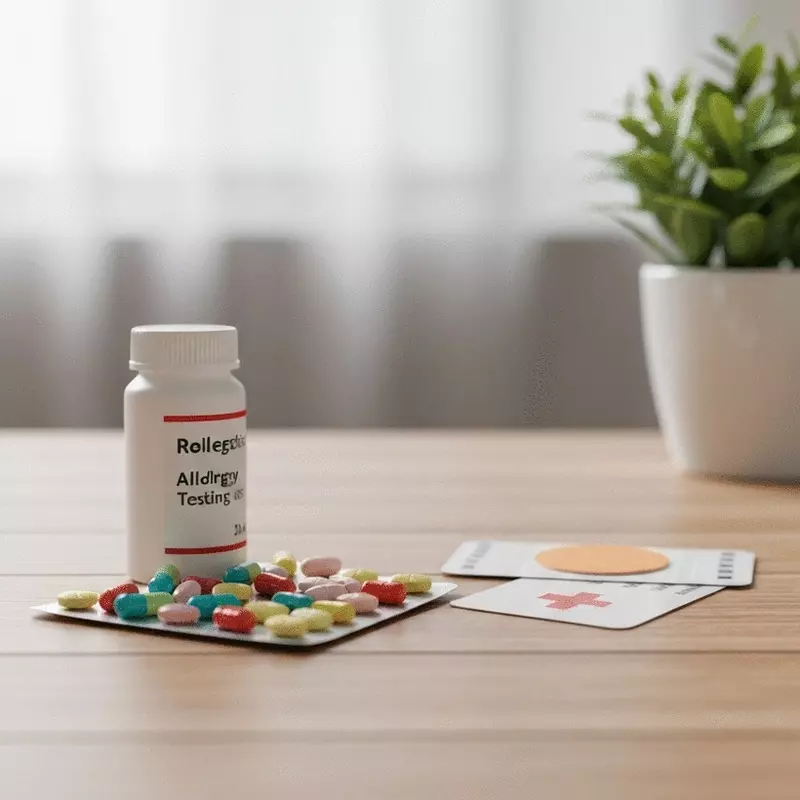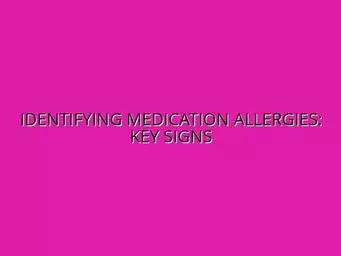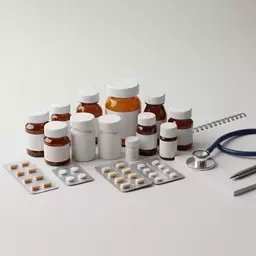Common Medication Allergy Guide
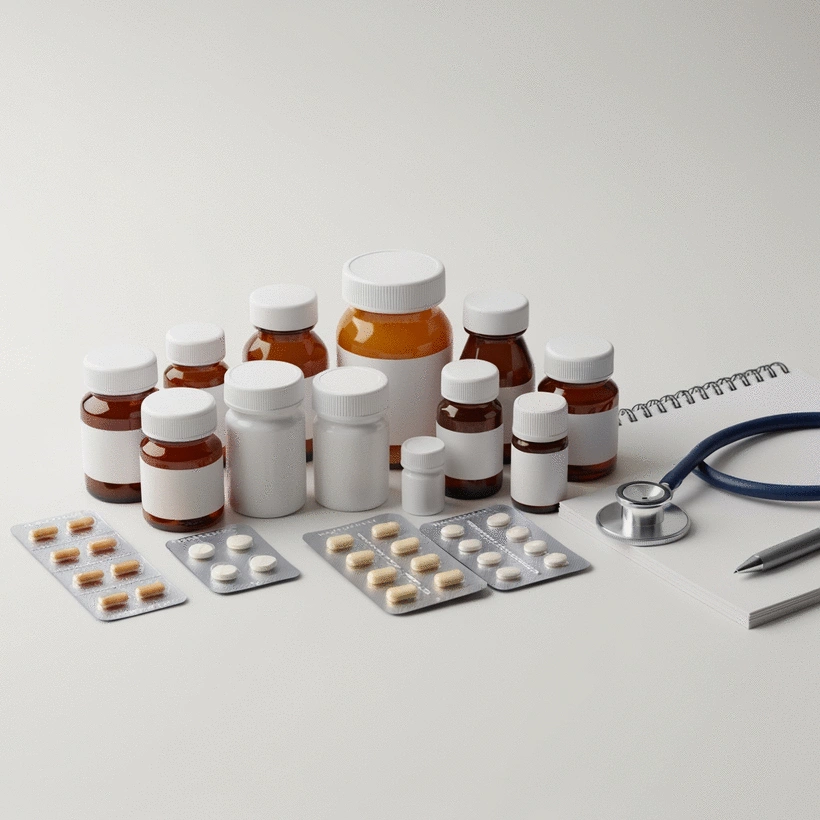
Understanding your medication allergies can be life-saving. Knowing the signs and risks empowers you to make informed choices about your health. Let's uncover the key insights that can help you navigate your allergies safely.
What You Will Learn
- Medication allergies occur when your immune system mistakenly identifies a medication as harmful, leading to allergic reactions.
- Recognizing symptoms early can prevent severe reactions, including life-threatening anaphylaxis.
- Certain factors, such as family history and age, can increase the risk of developing medication allergies.
- Maintaining an allergy journal and consulting healthcare providers can aid in effective management and safety.
- Education about allergies empowers individuals to communicate effectively with healthcare providers and make informed decisions.
- Allergy testing is crucial for identifying specific triggers and enhancing personal safety in treatment plans.
Medication Allergies: Core Information
Understanding medication allergies is vital for personal safety and effective health management. This visual summarizes key aspects, from their nature to proactive management strategies.
What Are Medication Allergies?
Immune system misidentifies a substance in medication as harmful, triggering adverse reactions. Can range from mild to life-threatening (anaphylaxis).
Who is at Risk?
- Family history of allergies
- History of other allergies/asthma
- Frequent medication use
- Age (children & elderly)
Why Awareness Matters
- Personal Safety & Avoidance
- Informed Decisions on meds
- Better provider communication
- Community Support
Key Proactive Management Strategies
Understanding Medication Allergies: Insights and Importance
Medication allergies are a critical concern that can significantly affect your health and well-being. Essentially, a medication allergy occurs when your immune system mistakenly identifies a substance in a medication as harmful. This triggers an allergic reaction, which can range from mild to severe. Understanding medication allergies is vital because they can lead to serious complications and may even require emergency treatment.

At I'm Allergic, we believe that knowledge is power when it comes to managing allergies. By being informed about the nature of medication allergies, you can better protect yourself and make safer choices in your treatment plans!
What Are Medication Allergies and Why Do They Matter?
Simply put, medication allergies are adverse reactions that occur when your body responds negatively to a medication, which could be anything from antibiotics to pain relievers. It's essential to recognize the significance of these allergies because they can lead to dangerous situations, including anaphylaxis, a life-threatening reaction that requires immediate medical attention. For more comprehensive information on drug allergies, the National Institute of Allergy and Infectious Diseases (NIAID) offers valuable insights into their mechanisms and management.
- Understanding the mechanism of drug allergies helps in prevention and management.
- Awareness can empower individuals to recognize symptoms early.
- It aids healthcare providers in selecting safer treatment options.
As someone who has navigated the complexities of allergies, I can attest to the importance of being aware of what medications may trigger reactions. It’s not just about feeling unwell; it’s about ensuring your safety and well-being!
Who is at Risk for Developing Drug Allergies?
It’s crucial to identify who might be more susceptible to developing medication allergies. Some key factors can elevate your risk, including:
- A family history of allergies
- Having a history of other allergies or asthma
- Frequent use of certain medications
- Age—children and the elderly can have different reactions
Knowing if you fall into one of these categories can help you take proactive steps to manage your health. If you or a loved one fits these descriptions, consider discussing your medication history with your healthcare provider for tailored advice.
We Want to Hear From You!
As we explore the complexities of medication allergies, we want to know your thoughts! Have you or someone you know ever experienced a medication allergy? Share your experiences and insights below:
Summarizing Key Insights on Medication Allergies
As we dive deeper into the world of medication allergies, it becomes clear that understanding these conditions is not just beneficial but essential. Awareness and education about medication allergies can significantly impact the lives of those affected. By knowing the signs and symptoms, individuals can prevent severe allergic reactions and ensure their safety while receiving medical care.

Moreover, it’s crucial to recognize that medication allergies can develop at any time, even if you've taken a particular drug before without issues. This unpredictability makes ongoing education vital. At I’m Allergic, we emphasize that knowledge truly is power when it comes to managing allergies effectively.
The Importance of Awareness and Education
Being aware of potential medication allergies is a foundational step in managing health. Here are key aspects that highlight the importance of education:
- Personal Safety: Understanding your allergies helps you avoid dangerous situations.
- Informed Decisions: Knowledge empowers you to make better choices regarding medications.
- Effective Communication: Providing accurate information to healthcare providers ensures appropriate treatments.
- Community Support: Sharing experiences can help others navigate similar situations.
It's essential to foster an environment where individuals feel comfortable discussing their allergies openly. By doing so, we can build a stronger community that prioritizes safety and awareness.
Encouraging Proactive Allergy Management
Proactive management is critical in navigating life with medication allergies. Here are some strategies that can help:
- Maintain an Allergy Journal: Keep track of your reactions to medications to identify patterns.
- Consult with Healthcare Providers: Regular check-ins with your doctor can help adjust your treatment plan as needed.
- Educate Friends and Family: Make sure those around you know your allergies and how to assist in an emergency.
- Stay Updated: Follow resources like I’m Allergic for new information and research on medication allergies.
By taking these steps, you can live confidently and safely, knowing that you’re prepared to manage your allergies effectively.
Frequently Asked Questions About Medication Allergies
Here are some common questions about medication allergies to further enhance your understanding and management strategies:
- What exactly is a medication allergy?
A medication allergy occurs when your immune system mistakenly identifies a drug as harmful, triggering an adverse immune response. This differs from side effects, which are predictable pharmacological effects of a drug. - What are the common symptoms of a medication allergy?
Symptoms can range from mild skin rashes, hives, itching, and fever to more severe reactions like swelling (angioedema), difficulty breathing, and anaphylaxis. - Can I develop a medication allergy even if I've taken the drug before without issues?
Yes, it is possible to develop an allergy to a medication you've previously taken without problems. The immune system can become sensitized over time. - What should I do if I suspect I have a medication allergy?
If you suspect a medication allergy, stop taking the medication and seek immediate medical attention, especially if symptoms are severe. Always inform your healthcare provider about any suspected allergies. - How are medication allergies diagnosed?
Diagnosis often involves a review of your medical history, a physical examination, and sometimes specific allergy tests like skin prick tests or blood tests, depending on the suspected allergen. - How can I prevent allergic reactions to medications?
The best prevention is to avoid the offending medication. Always inform all healthcare providers, pharmacists, and dentists about your allergies. Wearing a medical alert bracelet can also be beneficial.
Call to Action: Consult Your Healthcare Provider
Why Allergy Testing is Crucial for Your Health
Consulting with your healthcare provider about allergy testing is one of the most significant steps you can take for your health. Allergy tests can pinpoint specific medications that trigger reactions, allowing you to avoid them in the future. This proactive approach not only enhances your safety but also gives you and your healthcare team a clearer picture of your health. For more detailed information on drug allergy diagnosis, the U.S. Food and Drug Administration (FDA) provides guidance on drug safety and adverse reactions.
Stay Informed: Resources for Ongoing Learning about Drug Allergies
The journey of understanding medication allergies doesn’t end here. Staying informed is vital for ongoing management. Here are some valuable resources to consider:
- I’m Allergic: An online hub for allergy awareness and support.
- Allergy and Asthma Foundation: Offers comprehensive information and updates regarding allergies.
- Local Support Groups: Connect with others who share similar experiences and challenges.
- Healthcare Providers: Always consult your doctor for personalized advice and recommendations.
Let’s take charge of our health together! By utilizing these resources, you can stay educated and empowered in managing your medication allergies.
Recap of Key Points
Here is a quick recap of the important points discussed in the article:
- Medication allergies can trigger severe reactions, including anaphylaxis, making awareness crucial for safety.
- Individuals with a family history of allergies or frequent medication use are at higher risk for developing drug allergies.
- Education about medication allergies empowers individuals to make informed decisions and communicate effectively with healthcare providers.
- Keeping an allergy journal and consulting with healthcare providers can aid in proactive allergy management.
- Utilizing resources like I’m Allergic can enhance your knowledge and support in managing medication allergies.
